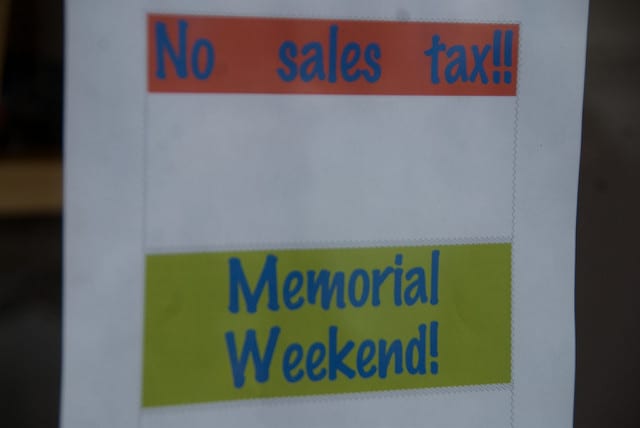Believe it or not, a number of people on the Postconsumers team have actually spent career time working on the other side of the equation as corporate marketing staff for consumer companies. We certainly value their input. So one day we asked them about some of the most insidious and uncomfortable things that they did as consumer marketing agents. We were actually surprised how many of them mentioned leveraging the Memorial Day and Labor Day holidays as marketing tools. To be honest, we hadn’t thought much about that, which shows how much we try to separate ourselves from the consumer machine. But as the marketers on our team explained the history and the thinking behind big Labor Day and Memorial Day sales, we started to see just how deliberate they were. This holiday weekend, as you’re thinking about possibly taking advantage of big “holiday weekend” sales, think about the following information trailblazing how those sales were crafted and why.
The Original Intent of Holiday Sales: Create Upticks During Slow Weekends
As we all know all too well, the amount of time off or vacation time people have in America is significantly limited. Memorial Day and Labor Day are two holidays when the majority of Americans have a three day weekend that they can enjoy. And, for many, that time over the years was spent doing, well, anything but shopping. Short vacations were taken. Social get-togethers and barbeques were had. Both of those holidays occurred during times when retail sales were often slow anyway (retail sales are often slower in the summer since the majority of the annual revenue comes during the holiday sales and then into the beginning of the year). When sales were lethargic to begin with and a weekend of dead sales could impact your numbers even more dramatically, there were really two choices that companies could make. They could close their store for the holiday days, understanding that they wouldn’t make break-even dollars that weekend anyway. Or they could entice people to leave their holiday weekend activities and go shopping by offering large discounts and sales to draw them into the stores.
Obviously, we don’t need to tell you which direction that decision tree took.
Over Time, Holiday Weekend Sales Became a Requirement as Consumer Behavior Changed
One thing that all marketers know is that over time, if you offer discounts, consumers will learn that behavior and wait for them. That’s exactly the evolution that happened with Labor Day and Memorial Day discounts. Over time, people who needed or wanted to make a purchase would actively hold off until Labor Day or Memorial Day weekend, knowing that stores would be offering deep discounts during that time period. This put retailers who wanted to avoid the holiday weekend discounting game at a disadvantage. If you chose to not participate in holiday weekend sales, you were essentially handing business away to your competitors, and you were doing it at a time during the year when sales were at their hardest to come by. By now, almost every type of both brick and mortar and online retailer works both Labor Day and Memorial Day sale strategies into their annual marketing plan. They include goals and forecasts of sales and often even advertising budgets to drive people to their sales. It’s almost as entrenched in consumer society as Christmas and winter holiday sales.
The Downside of Memorial and Labor Day Sales Part 1: Your Relaxation Time Becomes Consumer Time
There are really three things that you should keep in mind about the reality of holiday weekend sales and how they negatively impact society (and your life). The first is that they take time away from a limited amount of time off that many of us have to bond with friends and family, enjoy relaxation or even travel. Shopping is not a leisure activity, despite what society would have you believe. Obviously, there are bigger holidays that have been taken over in the year with consumerism (Black Friday, anybody?), but every moment of relaxation time that you give up to willingly enter the consumer machine is a moment of real living that you will never get back.
The Downside of Memorial and Labor Day Sales Part 2: It Takes Focus Away from the Important Messages of Those Holiday Weekends
Labor Day and Memorial Day aren’t just holiday weekends. They’re also periods of time when we’re encouraged to reflect on the sacrifices of many who made our country special. We likely don’t need to write very much about the discomfort level of marginalizing the importance of veterans or labor leaders by equating them with a discount on a washer/dryer set.
The Downside of Memorial and Labor Day Sales Part 3: Those Discounts Aren’t Really that Beneficial
What makes a mattress cheaper during Labor Day weekend? The answer is that during the rest of the summer it’s been priced to make the “big sale weekend prices” still profitable. So you’re not really benefiting by shopping during that weekend. You’re actually just making it more difficult for people to buy things at fair prices during the rest of the summer. If we all stopped buying into timed discount shopping, pricing behaviors would change.
Obviously, when and where and how you shop is entirely a decision that you need to make based on your own priorities and your own satisfaction of enough. But when we hear that marketers themselves are uncomfortable with the systematic holiday weekend discount paradigm, we think that it’s a great message to consider finding other ways to spend your time on Labor Day and Memorial Day!
Did we miss an angle on the relationship between these holidays and consumerism? Tell us about it on the social media channels below.
Facebook | Twitter | Instagram | Tumblr | Pinterest | Google+ | Medium
Photo Credit: Steve Rhodes via Flickr





